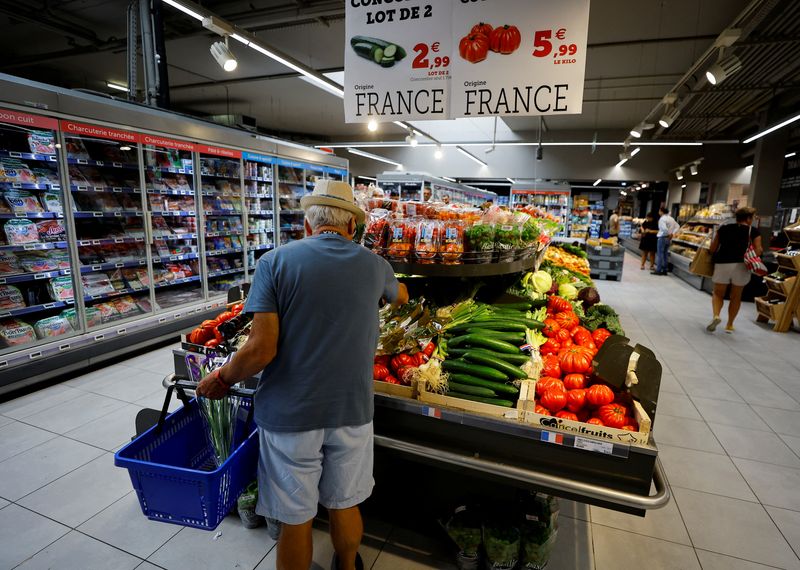FRANKFURT (Reuters) - Inflation in the euro zone extended its decline in June as the cost of fuel tumbled, more than offsetting an acceleration in prices for services, a preliminary reading showed on Friday.
The data, pointing to only the smallest drop in underlying inflation, was unlikely to sway the European Central Bank, which has pencilled in a ninth consecutive rate hike for July and is eyeing one in September too.
Inflation in the 20 countries that share the euro fell to 5.5% this month from 6.1% in May, chalking up its seventh decline in the last eight months, with Germany the only country to report an increase, Eurostat's flash estimate showed.
"Inflation is still high and sticky but momentum is moderating," said Frederik Ducrozet, head of macroeconomic research at Pictet Wealth Management.
But "core" inflation excluding energy and food, which ECB policymakers see as a better gauge of the underlying trend, only edged lower, to 6.8% from 6.9% - far from the sustained drop the central bank wants to see.
"The core rate is likely to remain well above the 5% mark in the next months which will (require) further rate hikes by the ECB," said Ulrike Kastens, an economist for Europe at DWS.
Services were the only category where price growth picked up - to 5.4% from 5.0% - demonstrating consumers' continued resilience in the face of higher borrowing costs, thanks largely to a strong labour market.
The euro zone unemployment rate remained at an historic low of 6.5% in May, Eurostat reported separately on Friday.
The ECB raised interest rates to their highest level in 22 years this month as it predicted inflation would stay above its 2% target through the end of 2025.
ECB President Christine Lagarde said this week that the central bank was unlikely to call a peak in rates any time soon, and most policymakers see a further hike in September as likely.
But they have come under fire from governments in Italy and Portugal, who worry about the hit to households and companies from higher borrowing costs.
Big differences remain between euro zone countries, with June headline inflation falling to as little as 1.6% in Spain and Belgium and 1.0% in Luxembourg while staying in double digits in Slovakia (11.3%) and close to them in the Baltics.
Germany stood out with an increase in headline inflation to 6.8% from 6.3%, partly the result of a hefty rail-ticket subsidy last summer that was not renewed this year.
"The ECB's job remains unenviable, as inflation figures across EU countries are beginning to show quite significant divergence," said Neil Shah, a director of research at Edison Group.
Which stock should you buy in your very next trade?
With valuations skyrocketing in 2024, many investors are uneasy putting more money into stocks. Unsure where to invest next? Get access to our proven portfolios and discover high-potential opportunities.
In 2024 alone, ProPicks AI identified 2 stocks that surged over 150%, 4 additional stocks that leaped over 30%, and 3 more that climbed over 25%. That's an impressive track record.
With portfolios tailored for Dow stocks, S&P stocks, Tech stocks, and Mid Cap stocks, you can explore various wealth-building strategies.


